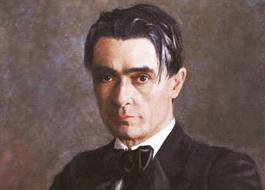
Rudolf Steiner. Credit: www.antroposofie.nl. All rights reserved.
In late 1918, Germany was in ferment. World War I had been brought to an end by a series of uprisings in the German armed forces, sparked off by a mutiny on board three ships that were anchored off the port of Wilhelmshaven. In the political melee that followed, councils of soldiers, sailors and workers led the call for “unity, justice and freedom,” as visions of a brighter future were hotly debated across the country. Left- and right-wing groups including Bolsheviks, conservative monarchists and moderate social democrats fought over radical new designs for German society. These struggles eventually led to the country’s first elected republican government in the form of the Weimar Republic.
During this ferment, the employees of some of Germany’s biggest companies including Daimler rallied around a particularly far-reaching idea: that everyone should participate in everything, from health and education, to politics and industrial democracy, to their own personal development, and to see these things as intimately connected to one another. It’s an idea that is just as revolutionary today, but where did it come from?
These groups were inspired by a controversial figure called Rudolf Steiner, an Austrian philosopher, writer and social reformer. Born in an area of Austria that is today Croatia, Steiner studied mathematics, natural history and chemistry in Vienna. He later lived in Berlin and eventually settled in Switzerland. Originally aiming to become a school teacher, Steiner worked as an editor and publisher of J.W. Goethe’s scientific works, and as a teacher at a community college, before spending the rest of his career as a freelance lecturer and writer.
In the early 1920s, Steiner enjoyed the status of a rock star, filling the largest halls of interwar Berlin for his talks. He was dissatisfied with the plethora of social reform ideas that marked Germany’s postwar days. Reform must go much deeper, he argued, to question not just social rules and systems, but how people perceive and shape the world itself. Borrowing from anarchist ideas about stateless, self-governed societies, Steiner’s philosophy fused individual transformation with the need for new institutions built on shared experience of the social world. Inspired by Theosophy and the founder of its offshoot Anthroposophy, Steiner believed in the existence of an “objective, intellectually-comprehensible spiritual world that is accessible to direct experience through a person’s inner development.”
As part of his critique, Steiner felt that too much trust was placed in the explanatory powers of scientific rationality when applied to social issues. While he was positive about the usefulness of science, he thought that its focus on quantifiable data, deductive verification and predictive modeling would eliminate insights from the largest element of the social sphere which is life itself, as it happens, among real people. Instead, science would slowly accustom people to accept technocratic systems that would run their lives.
Steiner feared that people would sacrifice the human ability to create and transform their worlds to the belief that science would provide them with a truth that was truer than their own experience. That should be a familiar thought today, when we are taught to mistrust our own judgments as flawed and subjective. Instead of developing our abilities to understand problems and exercise our judgment in solving them collectively, we look for scientifically-justified, “expert” solutions. The more complex the world becomes, the more we turn away from these abilities towards abstraction and standardization, in order to keep it comprehensible and manageable.
Steiner was not alone in his beliefs. Among others, the sociologist Helmut Schelsky has called attention to technocracy’s tendency for “self-legitimization,” a process that displaces individual will and imagination as the driving force of social change. Why continue to exercise these things if our visions lack the clarity of a scientifically-determined feasibility study? Why engage in a messy adventure with unpredictable results when rational analysis tells us that it won’t work? Under the rule of technocracy, Schelsky argued, society will lose the transformational power of the unexpected, the creativity of failure, and the sparks of imagination that are thrown off when things go wrong.
In contrast to technocratic thinking, Steiner believed that creative autonomy and the experience of direct interaction with other human beings must have a prominent place in any society worth living in. Therefore, the social world must always be accessible to the experience and influence of individuals. Moreover, Steiner was convinced that societies don’t need to be managed at all. They would be naturally stable, he thought, if groups and individuals respected their ‘inherent laws’ - or what Steiner called the “threefold social order:” democracy in political life, freedom in cultural life (including education), and cooperation in economic life (or “associative economies”), with each sphere having enough strength and independence to correct any problems in the others.
Throughout his ideas, Steiner’s unit of reference was the individual, but connected together through flexible structures that anticipated much of today‘s “network thinking.” Hence, direct cooperation among stakeholders is preferable to top-down regulation, he argued, because the latter detaches those affected from the shared experience of problems and solutions. Linking people together through creative action would, he thought, enable them to reach compromises more easily and adapt to unpredictable changes, thus building healthier societies over time. Closely-linked individuals in any sphere of life could not afford not to care about each other. Social, economic and political structures must therefore reflect this conviction - for example through self-government.
The ‘messiness’ inherent in this approach doesn’t bother Steiner. For him, there is no point in aiming at societal perfection, which is impossible. Only one step is crucial: instead of treating people as objects to be manipulated by impersonal social systems through material penalties and incentives, they must be allowed to act as subjects with the autonomy to manage their own lives. And that, Steiner believed, could only be achieved by activating their capacity to transform themselves continually.
Steiner’s conclusion is truly radical: nothing will save us from the numbing effects of rational standardization except for our own ability to advance our mental and spiritual capacities.
The practical legacy of Steiner’s philosophy lives on today in movements like the Waldorf Schools, social finance, and bio-dynamic agriculture, all of which are based around social cooperation and the constant transformation of people’s perceptive and creative abilities. Other examples include community-supported agriculture, which is showing how associations of producers and consumers can regulate supply and demand themselves; multi-stakeholder governance regimes, sharing economies and crowd-sourcing, which confirm that groups can operate effectively through collaboration; and the popularity of the Unconditional Basic Income in Europe, which is rooted in the desire to shape our lives in ways that are defined by human and not just material considerations. Aleksandr Solhenyzin, the Russian activist and Nobel Prize winner, was convinced that “humankind's sole salvation lies in everyone making everything their business.” Rudolf Steiner would agree.
Steiner offers a refreshing take on ideas about radical democracy that is surprisingly reflective of today’s social context. Artists and writers including Joseph Beuys and Saul Bellow have openly referred to his ideas as inspirational for their work, especially his conviction that artistic experience is just as important as science to the formation of knowledge. The philosopher Peter Sloterdijk calls Steiner the “greatest oral philosopher of the 20th century,” adding that “today, the idea that ‘we need to change our lives’ is not only interpreted in a Buddhist, Christian, stoic or other sense anymore, but as the urgent need to develop a form of collaboration that allows for the coexistence of all mankind on this fragile planet. Steiner perfectly exemplifies this idea.”
The key to Steiner’s thinking is a limitless faith in the ability of human beings to refine their experiential capacities so that they can see themselves and others more clearly - and act with greater empathy, care and understanding as a consequence. If this principle were embedded throughout the institutions of society, the psychological resilience of communities would grow, along with their ability to address the issues that face them such as climate change, economic downturns, and the effects of cultural globalization.
That Steiner’s vision lacks the predictive clarity of science should not deter us. After all, where science does not rule supreme, to paraphrase Niels Bohr, the opposite of a truth is not a lie but just another truth.
Read more
Get our weekly email



Comments
We encourage anyone to comment, please consult the oD commenting guidelines if you have any questions.